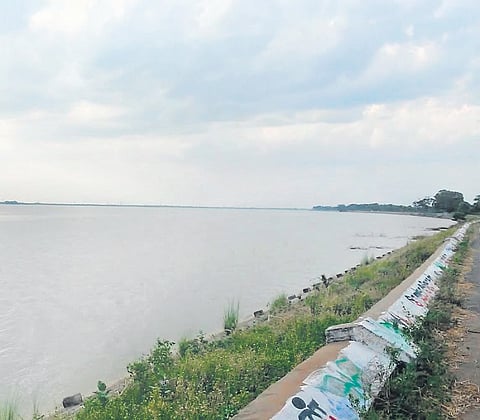

CHENNAI: For decades now, Tamil Nadu’s surplus water has been allowed to flow into the sea due to lack of storage arrangements and when the monsoon fails, the state finds itself in a fix.
After the DMK assumed office in 2021, it pledged to build 1,000 check-dams across the state over a span of 10 years. However, progress has been slow, with fewer than 50 check-dams completed in the past three years.
Insufficient desilting in major reservoirs exacerbates water storage concerns, primarily due to financial constraints. Among the southern states, Karnataka allocated Rs 21,019 crore to its water resources department, Andhra Pradesh Rs 11,043 crore, and Telangana Rs 16,792 crore in 2023–24. However, Tamil Nadu’s allocation stood at only Rs 7,500 crore.
There is a collective plea to the state government for increased funding to the water resources department to address pressing issues.
Speaking to TNIE, G. Ajeethan, state technical secretary of the Consortium of Indian Farmers Association, said, “Projects like river linking, modernisation of old canals, desilting work in major reservoirs, including Mettur, and increasing water storage facilities in all dams have been pending for years.
As a result, farmers are fighting with the Karnataka government to release water to save their perennial crops every year. Most of the farmers are not aware of the union government’s Accelerated Irrigation Benefit Programme (AIBP), which provides financial assistance to the state government to ensure early completion of irrigation projects. So, better communication and transparency from the government is necessary.”
Ajeethan also added, “The state government has been focusing on water management, but legislators are not interested in improving water catchment areas or rainwater harvesting. It is also essential to audit major reservoirs frequently, and the details, including storage level, should be placed before the public regularly. This will help farmers with timely cultivation.”
On the issue of sand scarcity, farmers expressed discontent with government-run quarries, citing unaffordable prices and political interference. This is the right time to modernise sand quarries with technical expertise from the likes of IIT to ensure transparency and fair pricing.
A senior official told TNIE, “We submitted a proposal to desilt Mettur reservoir, Vaigai, and a few major waterbodies six months ago. We expect that the fund allocation will be made in the upcoming budget for 2024–25. Then it will become a revenue model benefitting reservoirs and enhancing water storage.”
The official also said that state government had already crossed its borrowing limits and none of the banks came forward to lend a helping hand.
“Unless the state government allocates at least Rs 10,000 crore, it is impossible to execute even irrigation projects,” the official added.
KV Elankeeran, president of the Federation of Cauvery Delta Farmers Association, also urged the state government to construct more check-dams from the Upper Anicut across the Kollidam at Mukkombu to the downstream at Anaikarai in Thanjavur to enhance water storage in delta districts.
“The maintenance of the lakes is very poor. For example, the Veeranam’s storage is 1.46 tmcft. Even during the monsoon, storing above 1 tmcft is not possible due to a lack of maintenance. Therefore, it is necessary to invest more money in saving existing waterbodies and creating additional storage facilities,” he said.